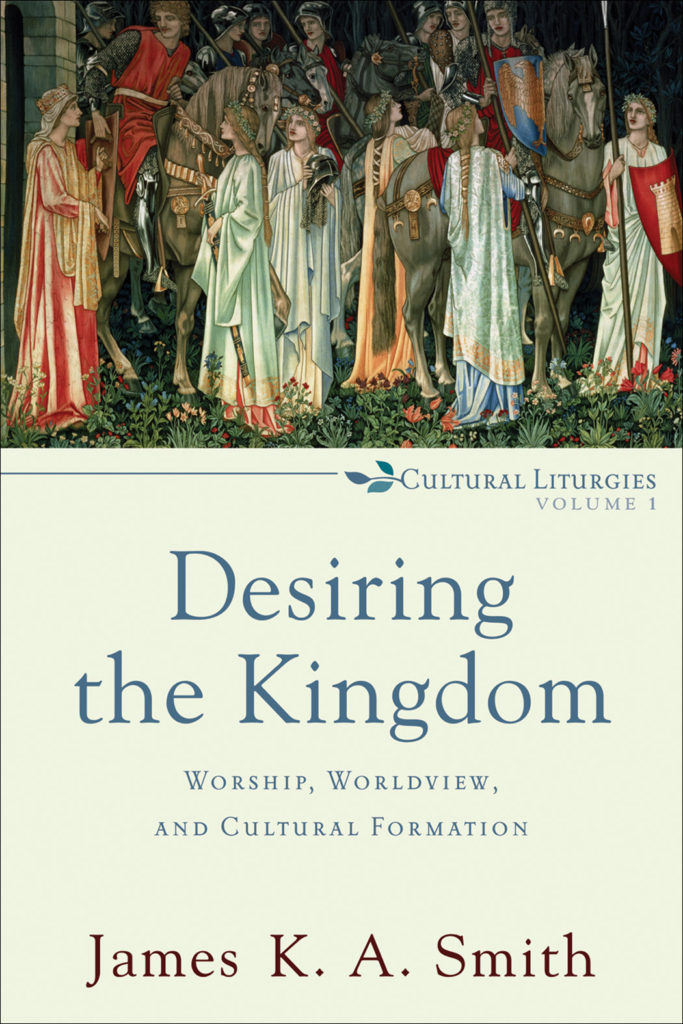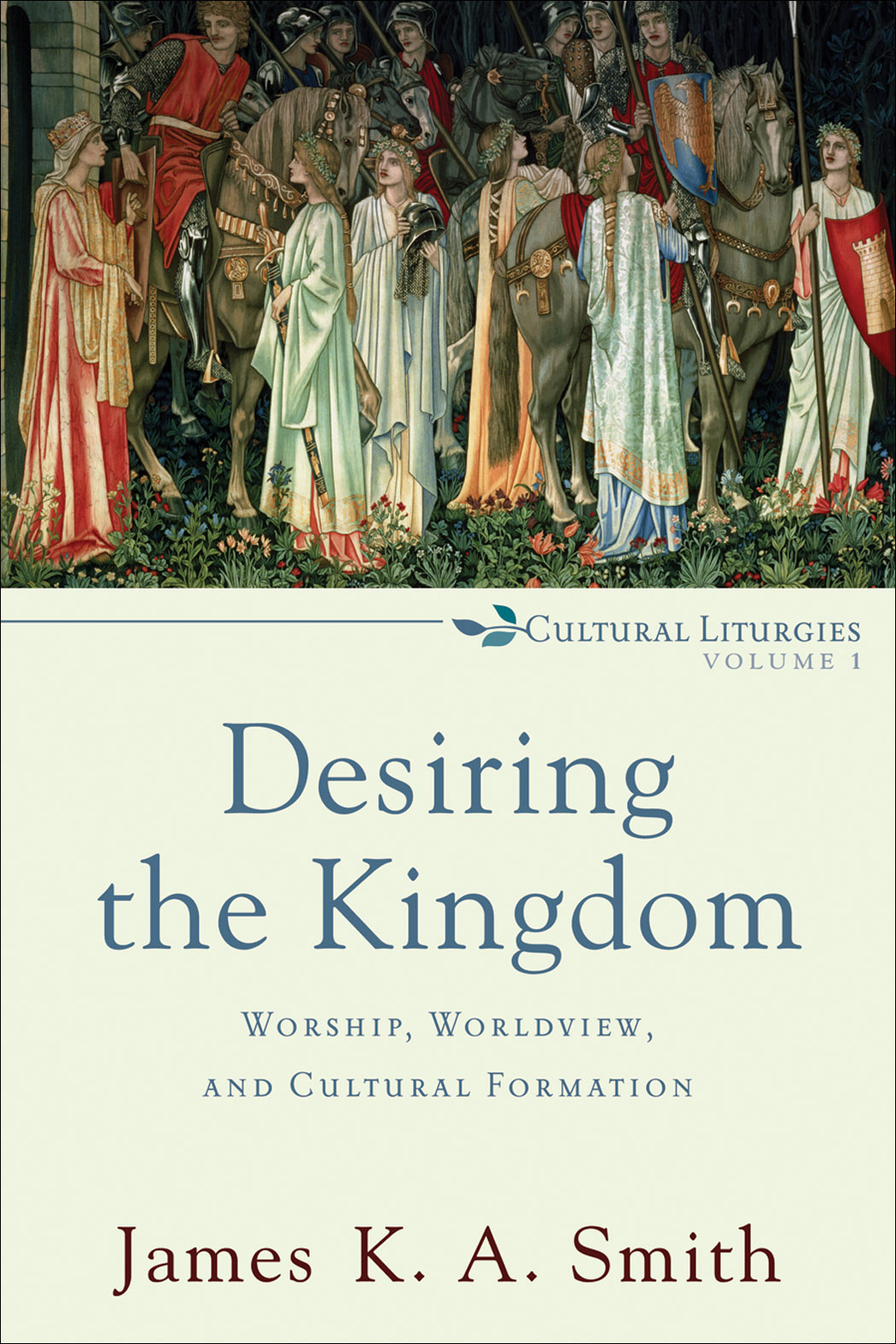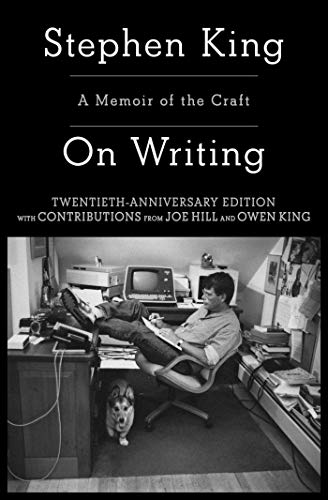He is repetitive, however, since his book is all about the benefits of repetition and the development of desire shaping habits, I don’t suppose he should apologize for using the word “pedagogy” a whopping 57 times and “telos” 38 times in his book!
What is Smith after with all this talk about habits and liturgies? He is in full revolt against Descartes axiom “I think therefore I am.” For Smith we are not fundamentally rational/thinking creatures, nor are we fundamentally believing creatures. Smith is utterly convinced that we are desiring creatures. To be human is to love (51) We are affective embodied creatures who make our way in the world by feeling our way around it (47) — So when it comes to the goal (telos) of education methods (pedagogy) Especially the formation of Christian education, we should be less concerned about ideas, rules, and doctrines and more concerned about capturing the imagination through pictures, stories, and embodied rituals. The reason for this, according to Smith is that our habits are the hinge that turns our heart”(56) as embodied lovers our loves are aimed and primed by the rituals and practices that turn those desires (126)
We need to give up our fixation on ideas, (65) he says, after all, before Christians had systematic theologies and worldviews they were singing hymns and psalms, saying prayers and celebrating the eucharist. (139) In so many churches belief and doctrine inform us and our worship follows as an expression of that belief. Smith says that’s backwards. Worship comes first, because desire forms knowledge.
The undeniable passion of this book is to call Christians back to liturgy. We need intentional embodied practices at corporate worship gatherings because they are invaluable in shaping our loves and desire’s back toward God. Absorbing information about God won’t do it. Smith’s argument was compelling especially when he compared how secular institutions such as the mall, the frat house, and the stadium all employ embodied rituals and habits with incredible success as the means to capture the hearts of people.
The curious paradox — Smith writes a book, books target the mind. His book is a bunch of ideas communicating that ultimately it’s not ideas that form our loves but rather practices. He himself is still fixated on ideas, by virtue of the fact that he writes a book. He wants us to believe that humans operate from the body up. (25) but yet his book, is attempting to grab our heart from the mind down, as books do. I point out this paradox to suggest that maybe there is more to the development of deep love than embodied practices. Maybe that’s just a part of it, granted even a big part, but this book on its face, is leading me to believe that if I just practice more liturgy, if I just actively engage in more embodied habits and rituals then a deeper love for God will be formed in my life. Is that true? I am not convinced.
What does the Bible say about this? — Smith doesn’t really interact much with the Bible. I think it has a lot to say. In the Old Testament we discover Jewish worship and see quickly that it is loaded with liturgy. The ancient worshippers were totally embodied — all the senses engaged in repetitive worship designed to deepen love for God. So far, Smith could simply point to that and say “see there you have it”. The only troubling business is when you get to the prophets and then ultimately to Jesus. They all launch full scale attacks on the religion of their respective days and liturgy is at the centre of their condemnation. The assault crashes in: They honour me with their lips, they are meticulous in the practice of their rituals, but yet there is a huge problem. From Isaiah to Jesus it’s the same problem. “Their hearts are far from me.” Bucket loads of liturgy, more than anyone in the 21st century Western world could even fathom, and yet the hearts of these worshippers are not even close to being captured by God’s love. What does one make of this? What is shocking to me, is Smith doesn’t even bring it up, not a single word word about it.
What does Church History say about this? — As you trace church history you see the same pattern emerging. Over time, faith often finds itself reduced to going through ritualistic motions, with hearts not at all captured by God’s love. After reading Luther’s biography (1500’s), and then Whitefield’s (1700’s) it’s plain to see that these men called their listeners away from dead ritual and into something that was not just felt, but also known and believed. It seems to me that somehow knowledge, belief, and desire working in concert is what awakened people to a deeper love for God.
I agree with Smith that love is what drives the human, it shapes our belief and our knowledge – or at least how we interpret knowledge. I also agree that at some level habitual practice is extremely formative in shaping desire, I’m just not sure if that’s all there is to it. I think there is more.
I think mission might have something to do with it — the habitual practice of outward action. (?) It might be why Paul says “What is important is faith expressing itself in love” (Gal 5:6) This coming after he straightly charges the Galatians believers not to fall back into their Jewish rituals and practices. — The Love of Christ must flow outward or it dies. Maybe for this same reason, Micah says to his listeners its not about bowing, and burning, and offering things to God in ritualistic fashion. Rather, it’s about doing what is right in the everyday, practicing mercy on people, and being humble. (Micah 6:8) — perhaps in the walking out of God’s mission love grows.






One Response
Good review! Couple thoughts:
1) Re: the paradox. Smith regularly speaks to this paradox at various points (he dedicates part of a chapter in the second book to this I believe). I think he aims to offset this by regularly referencing and pulling in more non-academic works: poems, movies, short stories, novels, popular music, etc as a way to move past just ideas to more of the affective and desire-shaping modes that he advocates.
2) I don’t think Smith says anywhere that we are ONLY creatures of desire or that ideas, knowledge, propositions, doctrine etc are not critical. This is the most common objection he gets to his writing and he’s quick to point out that this is a misunderstanding of his work. He obviously holds a very high view of ideas – he’s a philosophy prof. His point is that we and not PRIMARILY thinking or believing creatures. He’s getting largely from an Augustinian perspective. We are thinking creatures and believing creatures but not before we are loving creatures. Ultimately, his big picture goal is the renewal practice as he states in the outset of the book.